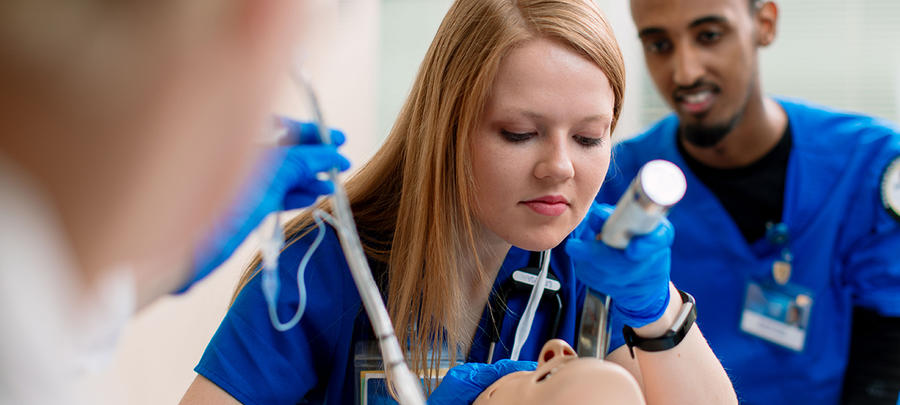The Bachelor of Science in Health Professions (BSHP) Respiratory Care program
delivers upper-division curriculum designed to prepare students to become respiratory therapists with advanced-level clinical skills.
The mission of the program is to:
- Provide professional courses and clinical experiences to support professional development
- Offer students options for specialized clinical study including:
- Adult critical care and patient transport
- Newborn and pediatric critical care
- Cardiopulmonary diagnostics - pulmonary function testing
- Cardiopulmonary rehabilitation, disease prevention, case management in asthma and Chronic Obstructive Pulmonary Disease (COPD), as well as smoking cessation and lung health counseling
Careers
Respiratory therapists help assess cardiopulmonary systems to treat and monitor heart and lung problems. The care provided by respiratory therapists may include administration of oxygen, cardiopulmonary resuscitation, management of mechanical ventilators, administering medications to the lungs, monitor cardiopulmonary systems and measuring lung function. Patients range from premature infants needing rescue breathing to seniors who require pulmonary rehabilitation to live with chronic lung disorders.
Respiratory therapists are important members of the health care team. They work under the medical direction of doctors with expertise in pulmonary medicine, critical care, pediatrics, neonatology and rehabilitation. Respiratory therapists assume significant responsibility for patient care, working closely with nurses, physical therapists, radiographers and social workers.
Employment
Employment opportunities are primarily in hospitals and medical centers, but also include clinics, rehabilitation centers and the delivery of home respiratory care. Professional advancement beyond the staff practitioner level includes roles in critical care transport, education, management, rehabilitation, case management, critical care, diagnostic lab, biomedical industries and sleep medicine.
Job Outloook
Employment of respiratory therapists is projected to grow 12 percent from 2014 to 2024, according to the Department of Labor. Growth in the middle-aged and elderly population will lead to an increased incidence of respiratory conditions such as pneumonia, chronic obstructive pulmonary disease (COPD), and other disorders that can permanently damage the lungs or restrict lung function.
Salary
On average, respiratory therapists earn an annual salary of $67,190/yr in Minnesota (data as of 2018 from the Bureau of Labor Statistics).
Accreditation
The Respiratory Care Program is accredited by the Commission on Accreditation for Respiratory Care (CoARC).
Program Number: 200172
www.coarc.com
Phone: 817-283-2835
CoARC accredits respiratory therapy education programs in the United States. To achieve this end, it utilizes an ‘outcomes based’ process. Programmatic outcomes are performance indicators that reflect the extent to which the educational goals of the program are achieved and by which program effectiveness is documented. Student and graduate outcomes for programs are listed in the CoARC Programmatic Outcomes Data.
